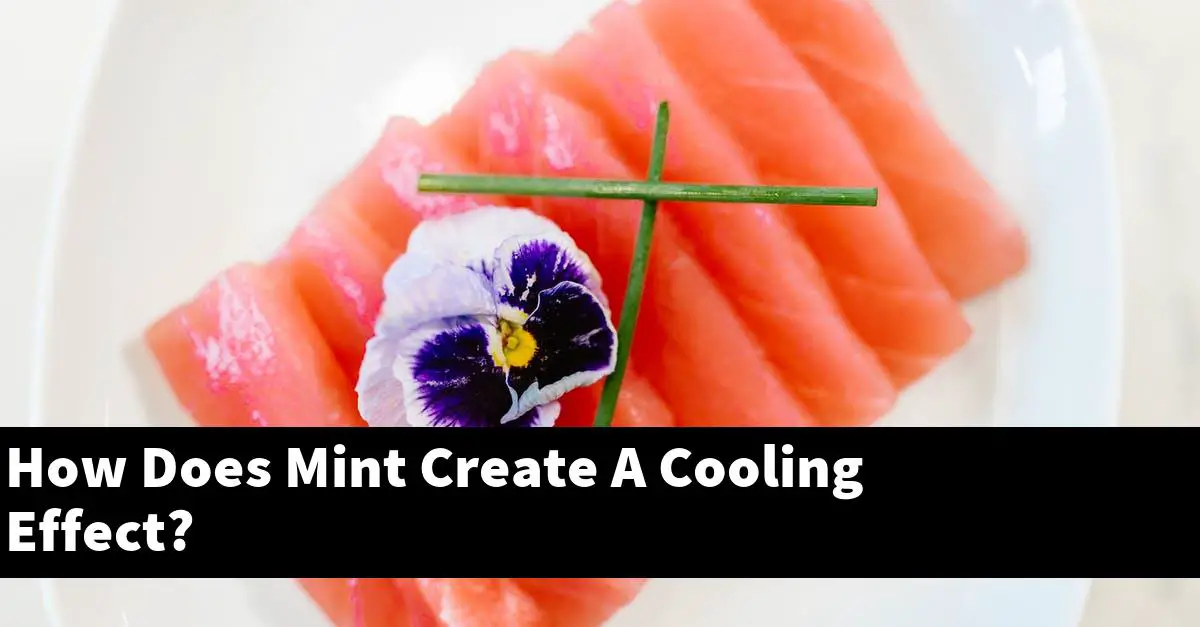Mint is a popular herb that is used in many dishes and drinks. It has a strong, refreshing flavor that can also be used to create a cooling effect.
When mint is applied to the skin, it can help to cool and soothe sunburn or other skin irritations. Mint can also be used to create a cooling effect in the body, which can help to relieve fever, headaches, and other ailments.
Why does mint taste so good?
The flavor of mint comes from the chemical menthol. Menthol is a cooling agent that is found in most chewing gums and mints.
When you chew on a mint, the menthol travels through your mouth and into your stomach. This cooling sensation helps relieve stomach pain and gas.
Does mint have cooling properties?
Mint does have some cooling properties. When mint is applied to the skin, it can help to reduce inflammation and cool the skin.
Mint also contains menthol, which has been shown to have cooling effects on the skin.
Why does mint feel cold with water?
Mint is a herbaceous plant that originates from the Mediterranean region. The leaves and the stems are covered with a fine, downy hair.
When the mint is crushed or dried, the oil and water vaporize, leaving the cold, hard seed behind. Mint’s oil and water vaporize at a lower temperature than the surrounding air, which causes the mint to feel cold to the touch.
Why does mint make me sneeze?
Mint is a plant that contains oils and menthol, which can cause a person to sneeze. The menthol in mint can irritate the mucous membranes in the nose, leading to the release of histamine.
Histamine can cause a person to sneeze.
Why does peppermint oil feel cold?
When peppermint oil is applied to the skin, the oil is cold because it is a liquid at room temperature. When the oil is rubbed into the skin, it forms a thin film that insulates the skin.
This is because the oil is a liquid at room temperature and it takes time for it to warm up and become a gas. When the gas is warm, it can escape from the film and cold the skin.
Why do mints chill your mouth?
Mints are a type of fruit that are often chilled to make them more refreshing. When the mint is chilled, it sends a chill down your throat, which makes you feel colder.
Is mint heating or cooling?
The answer to this question depends on the type of mint. For peppermint, the answer is that it is cooling.
For spearmint, the answer is that it is heating.
Why does mint make my skin feel cold?
Mint is a plant that is known for its strong scent and its ability to cool the skin. The oils in mint are volatile and can cause the skin to feel cold.
Does mint activate cold receptors?
There is no scientific evidence that mint activates cold receptors. Some people may believe this to be the case because the smell of mint is often associated with cooling temperatures.
However, there are other factors that may contribute to the cooling sensation, such as the wind blowing through your hair or the cold air hitting your skin.
Why does mint hurt my mouth?
Mint is a plant that is known to contain certain chemicals that can be irritating to the mouth. When mint is chewed, these chemicals can be released into the mouth and cause a burning sensation, a bitter taste, and a headache.
Why does mint burn my eyes?
Mint is a flowering herbaceous plant in the family Lamiaceae, native to Europe, North Africa, and the Middle East. The plant is grown for its aromatic leaves, which are used in cooking and as a flavor in many foods.
Mint is also used in some medications.
One common compound in mint is menthol. Menthol is a cooling agent and can cause eye irritation when its concentration is high.
Mint is also high in tannins, which can irritate the eyes.
How does mint make water colder?
Mint makes water colder by releasing a cold vapor. The vapor cools the water and makes it less dense, which in turn decreases the amount of heat that can be transferred through the water.
Do mints have a cooling effect?
Mints are believed to have a cooling effect on the mouth and throat. This is due to the mints containing menthol and other cooling agents.
Conclusion
Mint creates a cooling effect because it contains menthol. Menthol is a substance that has a cooling sensation when it comes into contact with the skin.
When mint is applied to the skin, the menthol in the mint causes the skin to feel cool.

